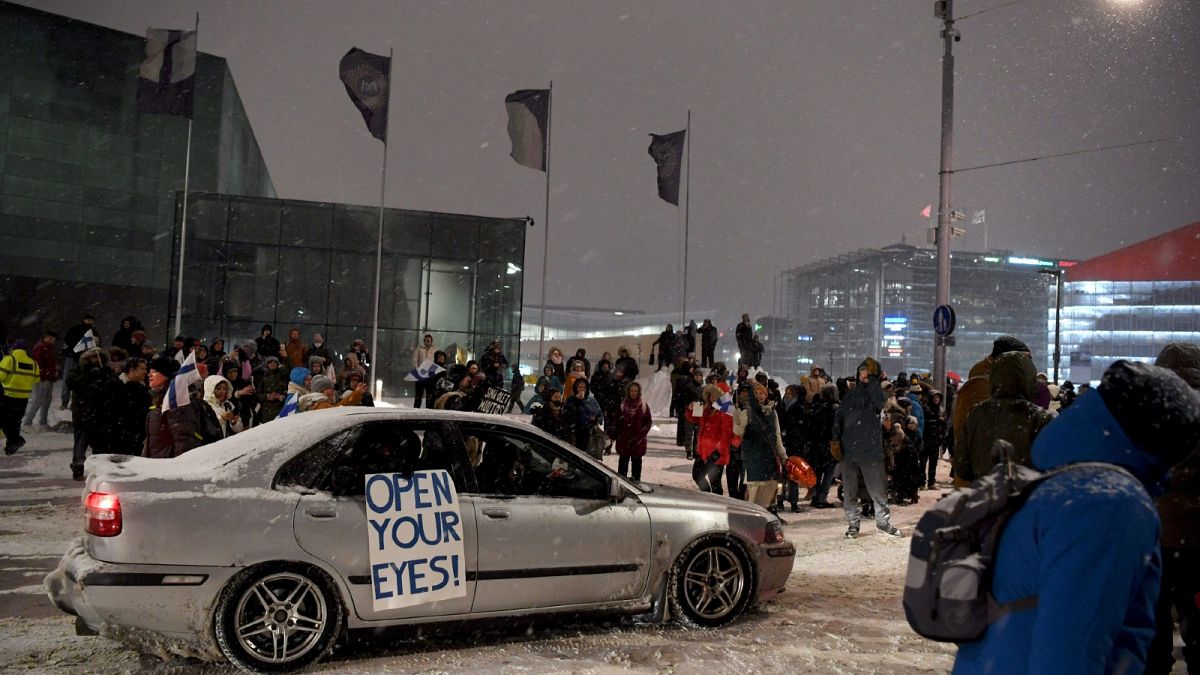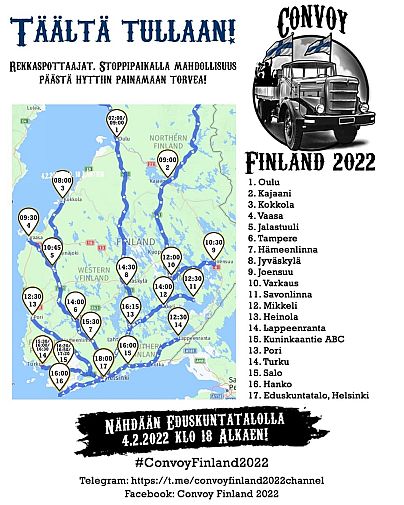There are rising levels of frustration across Finland over what protesters see as a government slow to allow society to open up again.
It was already dark, with a snowstorm in the forecast, when a few dozen delivery vans, motor homes and private cars rolled into Helsinki city centre on Friday evening noisily tooting their horns.
This was the beleaguered culmination of ‘Convoy Finland’, a protest concept imported from Canada, which aimed to shut down the Finnish capital with a gridlock of trucks, and attracted tens of thousands of people to its social media channels in recent days.
Police say that 700 people lined the capital’s main thoroughfare outside parliament in anticipation of the convoy’s arrival: many swarming onto the streets blocking traffic, some waving Finnish flags or holding signs with “freedom” or anti-vaccination symbols drawn on them.
Convoy organisers - far-right and anti-vaccine protesters, coronavirus deniers and ethno-nationalists - demanded the resignation of prime minister Sanna Marin’s government, a 50% cut in fuel prices, and an end to all COVID restrictions.
But after an initial surge in online support for the convoy, factional squabbles, arguments between several key organisers, disagreements over aims, and even a call to storm parliament saw their support melting away.
“It's comedy gold. Like a road trip for the clinically confused” said one Finn following events on social media.
Still, police were exercising caution after 11th hour negotiations with convoy organisers, warning local residents about six days of possible disruption near the parliament building, and banning drone activity in the city centre while they marshalled the protest with officers on horseback, and a fleet of police vans.
“The value is more in the entertainment, people want to follow a kind of reality TV unfolding in front of their eyes,” Niko Pyrhönen from the University of Helsinki, a researcher who followed the evolution of the convoy on its Telegram channel, said.
“Inside the groups they’ve been very disorganised, and had many disagreements” he told Euronews.
Far-right and anti-vaxx movement converge
Broadly speaking most Finns complied with government restrictions during the first year of the pandemic, as a state of emergency was declared for only the first time since WWII; schools were closed; bars, restaurants and nightclubs were shuttered; social distancing rules introduced and people were told to work from home where possible.
That stems in large part from a natural Finnish tendency to trust in the government and policy experts.
But as the pandemic dragged on, and rules were relaxed and tightened depending on infection rates, there’s been an increasingly vocal pushback not just against continued restrictions but highlighting a lack of financial support for many workers.
There’s been a convergence too of anti-vaccination groups, coronavirus deniers and the right-wing of Finnish politics which has begun co-opting tactics they see working abroad.
“The main thing I think is how supra-national the far-right is. Through social media it seems like these protests are immediately replicated across the globe," Oula Silvennoinen, an Academy Research Fellow who studies historical and modern far-right and fascist movements, explained.
“The Finnish far-right takes their cues immediately from what happens in the US and North America, and they have key points here and they sort of do similar activities.”
Silvennoinen said the extremist far-right have been actively courting the anti-vaxxers to integrate them into their own movement, or gain a foothold in theirs.
“And that’s what you see among these convoy people, there are these Soldiers of Odin and other neo-Nazis there, and the Blue-Black League [a fascist organisation] has openly voiced their support," she added.
Other protests highlight frustrations as restrictions remain
Although the convoy demonstrators represent a radical right-wing fringe, other protests this week in Finland show rising levels of frustration at what they see as a government slow to allow society to open up again.
While the Finnish government is widely perceived to have handled the coronavirus crisis well overall, Finland is one of the last countries in the EU to fully relax restrictions: this week the government announced that business won’t be going back to normal for bar and restaurant owners until the beginning of March.
That didn’t go far enough for hundreds of workers from the arts and culture sector who gathered outside the prime minister’s office on Thursday to call for an immediate end to measures that impact their industries.
And on Friday dozens of bars and restaurants around the country will defy legal restrictions on opening hours and welcome customers for late-night drinking and dining.
“It’s symbolic. And I find it important. We had 600 members in our Telegram group with everyone saying we have to do something," Petter Larsen, a bar and restaurant owner in the southern coastal town of Porvoo who has become the face of the ‘Open To The Public’ campaign, said.
Larsen, 35, told Euronews they’re not only protesting the current restrictions but also against a law that makes it easy for the government to close down hospitality venues.
“As long as they [the government] can just do whatever they want, they will make their decisions based on fear and feelings, instead of statistics and data," he argued.
There’s been an overwhelmingly positive response, Larsen said, about his decision to remain open and serve customers beyond what is currently legally allowed. However, he could face a suspension of his alcohol license, and has already been warned by local authorities that at least one complaint has been filed against him in advance of breaking the rules.
Researcher Oulu Silvennoinen said he can understand that people in sectors hardest hit by COVID restrictions are “at the end of their tether.”
“Among them you see similar tones adopted, ‘we’ve had enough’ or ‘the government is screwing everything up’ which is understandable” he added.
“That’s radicalisation in progress. If restrictions should continue I have no doubt that at least some of these people would next find themselves among the anti-vaxxer or the convoy crowd.”



